Redditor Seeks To Know If It’s Wrong To Keep The Cat Instead Of Letting Their Lonely Grandfather Have Him
Shelters may be quite stressful places for animals. Moving to a shelter or rescue with other animals and humans they don't know may be a major adjustment for a cat that is used to living in a house it is familiar with and comfortable in.
It's also possible that a shelter or rescue will run out of room, which would stress your cat even more. It's best to try to find your cat a home personally in order to offer it the best opportunity possible.
Your cat will be less stressed and probably adjust to its new home more easily if it can stay in your house while you look for a new family. In other words, you can give up your cat by bringing it to a rescue group or shelter that accepts surrenders.
This is another choice that will assist your cat in being seen by millions of potential adopters if you value making sure it is adopted into a loving home. But what happens when this isn’t the case?
What if it’s your lonely grandfather who needs your pet? Well, that is the situation we see in today’s AITA story.
The OP has a cat who is loved dearly. You see, the OP was going through a lot during that time, and having the cat there to take care of made the OP take better care of it.
But now, his grandfather, who is a widower, wants the cat as a companion since he has developed a liking for it.
The Title...

And the story begins
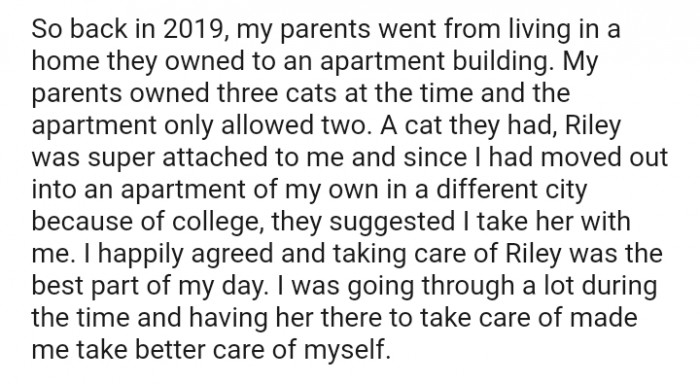
I ended up dropping all my college classes

Understanding the Emotional Weight of Pet Ownership
Dr. Sarah Thompson, a psychologist specializing in family dynamics, notes that pets often serve as critical emotional support for their owners.
Research indicates that the bond between humans and their pets can alleviate feelings of loneliness and depression, especially for elderly individuals.
In this scenario, the Redditor's grandfather may be experiencing an exacerbation of loneliness, making the decision to keep the cat more complex.
Understanding the Emotional Complexity
This situation highlights a profound emotional conflict between love for a pet and concern for a family member's loneliness. According to Dr. John McAdams, a psychologist at the University of Michigan, our attachments to pets can be deeply rooted in our emotional needs and past experiences of attachment.
Research suggests that the bond we form with animals often mirrors our human relationships, serving as a source of comfort and companionship. Thus, the decision to keep the cat may not just be about the animal itself but also about fulfilling the owner's emotional needs.
Navigating Complex Family Dynamics
Dr. Emily Carter, a developmental psychologist at the University of Michigan, emphasizes that family dynamics can be incredibly complex, especially when they involve the emotional well-being of both older and younger generations.
Her research indicates that pets often serve as emotional anchors for individuals, especially for elderly family members who may feel isolated or lonely.
When making decisions about pet ownership in families, it's crucial to consider not just the immediate desires but also the emotional ramifications for all involved.
I decided to go back to school in August
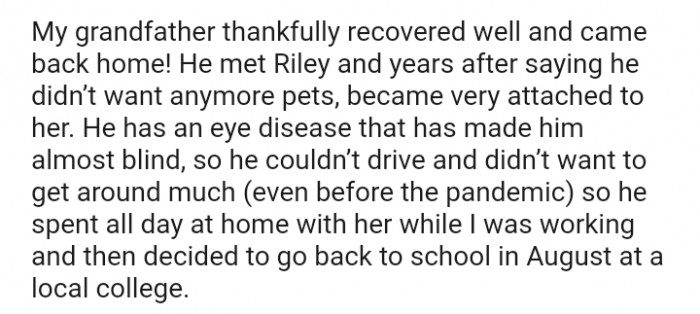
My grandfather planned on selling the house

I would be selfish to take away Riley
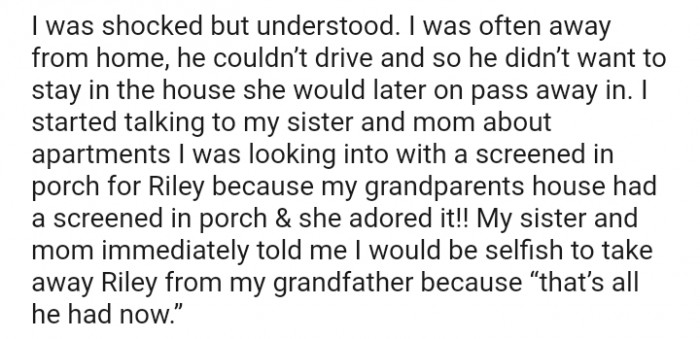
Psychological studies have shown that giving up a pet can trigger feelings of guilt and grief, akin to losing a family member.
Many people face a moral dilemma when making decisions that affect their loved ones, including pets, and this can lead to emotional distress.
Understanding the psychological impact of this attachment can help individuals navigate such decisions with greater empathy and awareness.
Moreover, the notion of sacrificing a pet for another's happiness brings forth the concept of altruism versus self-care. Studies indicate that altruistic behavior can lead to significant psychological stress if it compromises one's own well-being.
According to research published in the Journal of Personality and Social Psychology, individuals often struggle with decisions that pit their needs against those of loved ones, particularly when emotional attachments are involved.
Psychological studies highlight that attachment styles formed in childhood influence adult relationships, suggesting that the grandfather's attachment to the cat may be rooted in deeper emotional needs. According to Dr. Alexandra Solomon, a relationship therapist, "Pets can serve as a bridge to emotional connection, especially for those who may feel isolated." This connection can be particularly pronounced in elderly individuals who may grapple with loss and isolation, as noted by Dr. Bobbi Wong, a clinical psychologist who states, "Animals often provide a sense of purpose and companionship that can alleviate loneliness in older adults."
Riley has been of great help to the OP
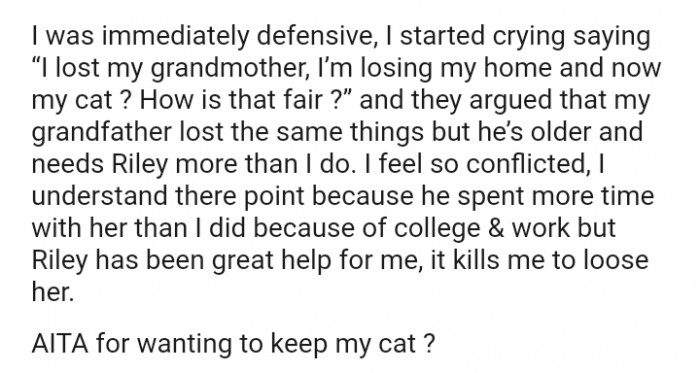
Here are a bunch of the topmost comments from Redditors...
Your grandfather can adopt a different cat

Getting an older kitten would be preferable
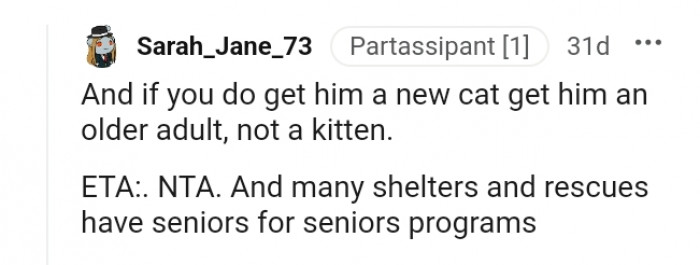
The Loneliness Factor
According to research published in the Journal of Social and Personal Relationships, loneliness in older adults can significantly impact their mental health.
When considering the grandfather's loneliness, the cat could provide companionship, reducing feelings of isolation.
It's essential to weigh these factors against the emotional needs of both the grandfather and the Redditor, creating a thoughtful approach to this decision.
The Role of Loneliness and Its Impact
Loneliness in older adults is a critical issue that has garnered attention in psychological research. Dr. Julianne Holt-Lunstad from Brigham Young University has extensively studied the effects of loneliness, revealing that it can lead to serious health consequences, both mental and physical.
Her research demonstrates that maintaining social connections is vital for well-being, especially in older adults who may face isolation. Thus, while the grandfather's need for companionship is valid, it's essential to recognize that the cat also provides emotional support to the owner, complicating the decision.
The Emotional Impact of Pet Ownership
Dr. Sarah Gold, a clinical psychologist, notes that letting go of a pet can trigger grief and loss, similar to losing a family member.
Her studies demonstrate that the emotional bonds we form with animals can profoundly influence our well-being, particularly in vulnerable populations like the elderly.
Therefore, it's essential to weigh the psychological benefits of keeping the cat against the grandfather's emotional needs.
You should maybe get him a new cat

Taking care of him full time could be too much for him
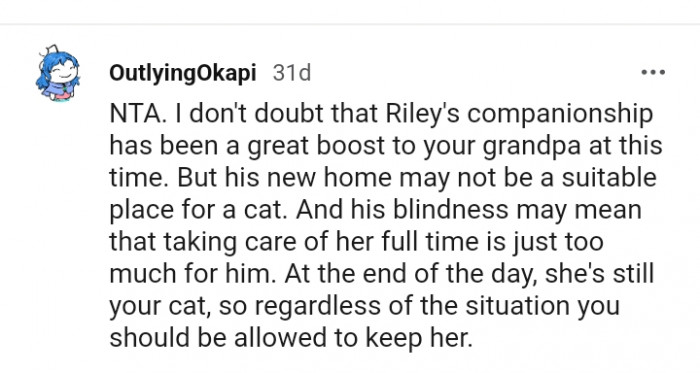
He has a fall while he is alone

Experts in animal-assisted therapy emphasize that pets can significantly enhance emotional well-being, particularly for seniors.
Engaging with animals has been shown to lower blood pressure, reduce symptoms of anxiety, and even improve mood.
Therefore, if the grandfather has a strong emotional attachment to the cat, it might be beneficial for his mental health to consider ways to keep the cat involved in his life, even if he can't care for it full-time.
On a practical level, exploring alternatives could be beneficial. For instance, involving the grandfather in the cat’s care could foster a sense of connection without requiring the owner to give up their pet.
This approach aligns with research indicating that shared activities can enhance emotional bonds and improve the quality of life for both parties involved. Engaging in joint caregiving tasks may help alleviate loneliness for the grandfather while also allowing the owner to keep their beloved cat.
Practical solutions might include facilitating a shared experience, where the grandfather and the cat can interact regularly, providing both companionship and a sense of shared responsibility.
Research suggests that engaging in joint activities can strengthen familial bonds and alleviate feelings of loneliness.
In this case, scheduling regular visits or allowing the grandfather to help care for the cat could be beneficial for both parties.
There are likely a few opportunities to give and take
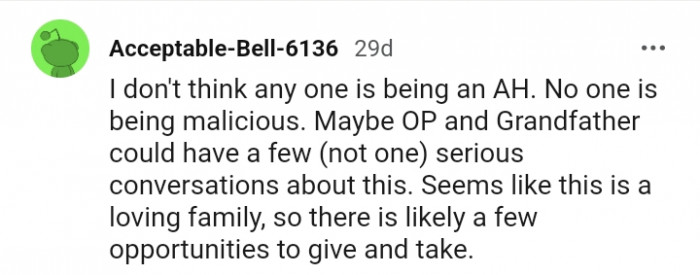
Taking away your beloved pet is out of line
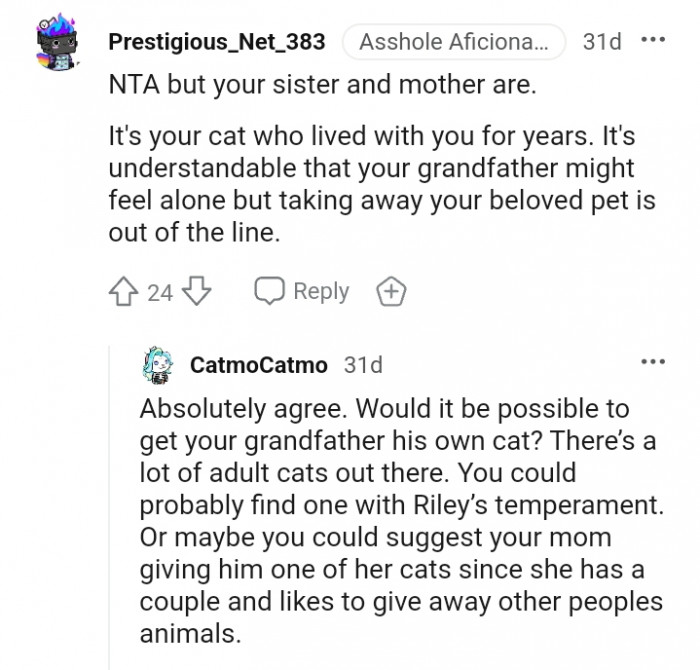
You may want to consider it
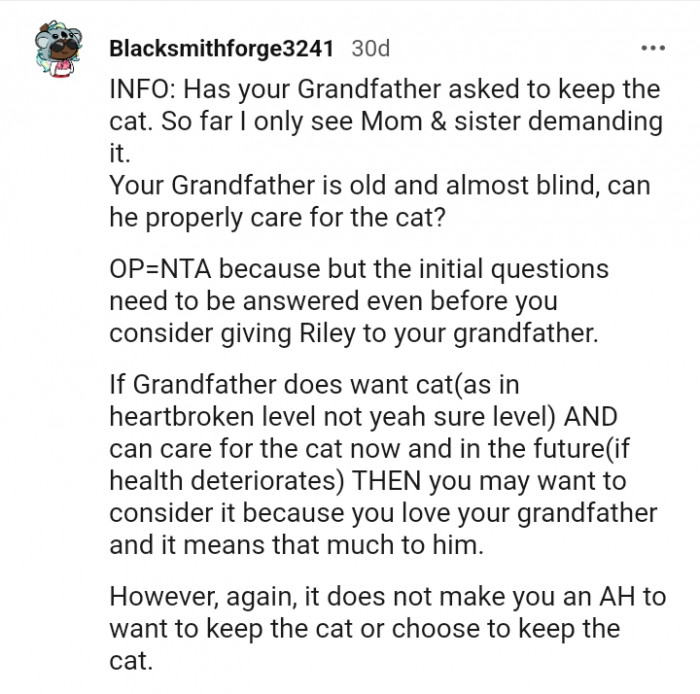
Navigating Family Dynamics
Family systems theory suggests that decisions involving pets often reflect broader family dynamics and emotional connections.
Dr. Jennifer Moore, a licensed therapist, explains that these decisions can sometimes lead to conflict, especially when different family members have varying emotional needs.
Open communication about feelings and needs can help to mitigate potential conflict while ensuring everyone feels heard and valued.
He can look into fostering for a local rescue
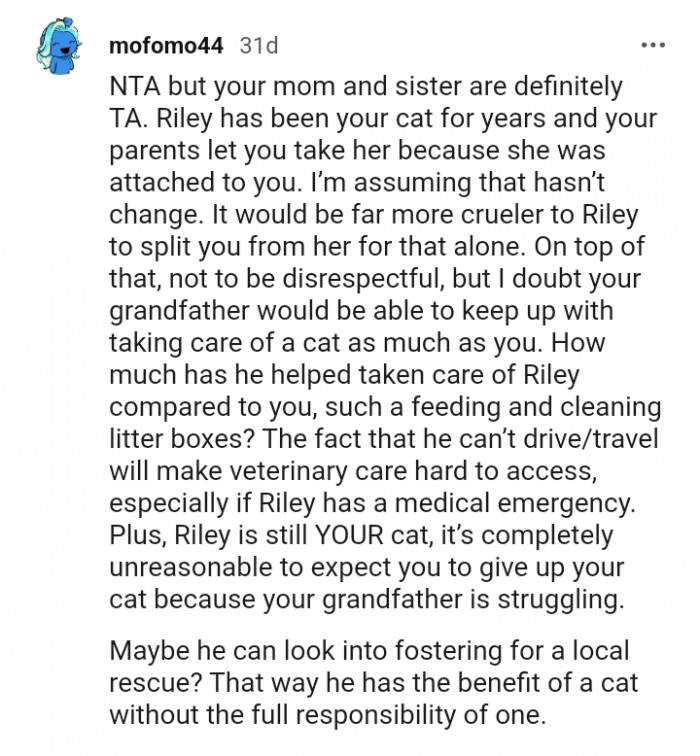
It might be nice for your grandfather to have a companion
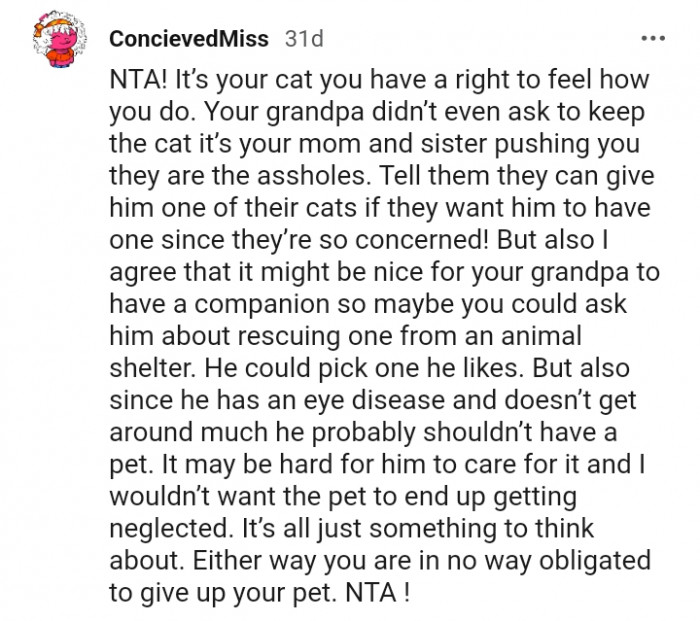
You know she'd be in a loving home
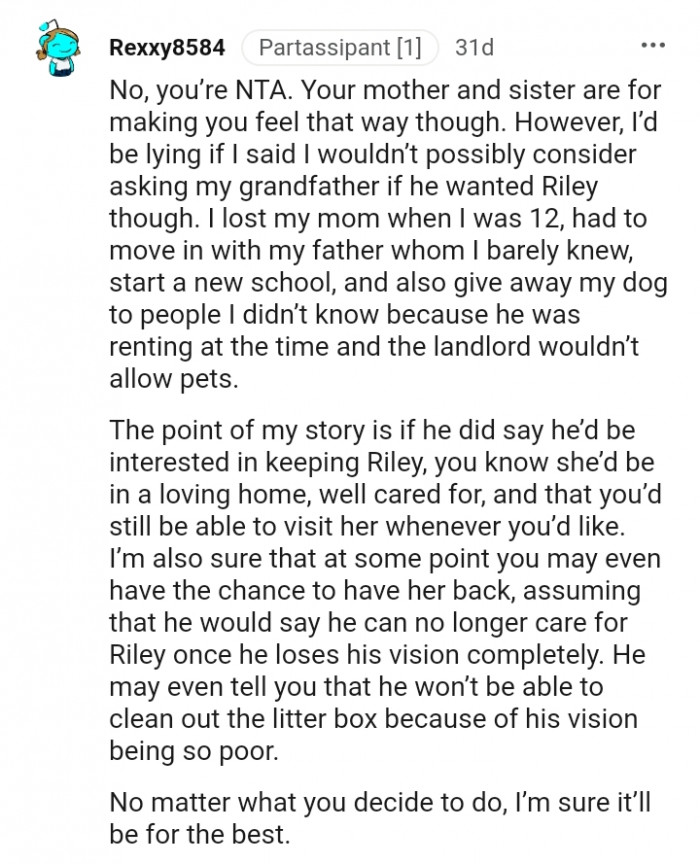
To navigate this situation effectively, consider involving the grandfather in discussions about the cat's care.
Encouraging him to express his feelings about the cat and discussing potential compromises could foster a sense of agency and involvement.
For example, perhaps there’s a way for him to interact with the cat regularly, even if he can’t take full responsibility for its care.
You have lost so much too
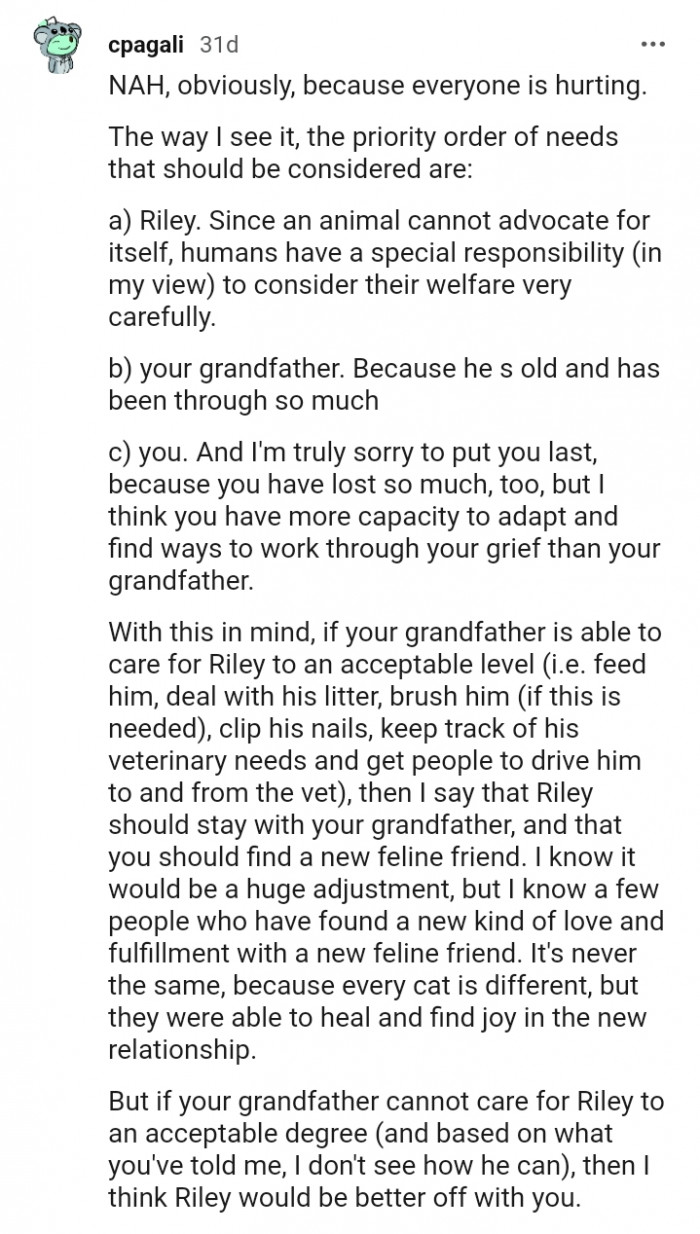
Fostering for a local rescue sounds like a good idea, according to this Redditor

This Redditor is of the opinion the grandpa gets a senior cat

The Importance of Compromise
Research indicates that compromise in familial relationships can enhance overall satisfaction and emotional health.
By finding a balance between keeping the cat and addressing the grandfather's needs, family members can strengthen their relationships and emotional bonds.
Utilizing conflict resolution strategies can facilitate open dialogue and ensure that all parties feel respected and valued.
Our pets are our little furry buddies, and we love them to bits. No one would be in a hurry to give up their pets, especially when they don’t have to.
Redditors understood the OP’s plight, and we do too. What do you think about this whole scenario?
Leave your thoughts below and share this post as well.
Psychological Analysis
From a psychological standpoint, the decision to keep the cat or let the grandfather have him reflects deeper emotional complexities at play.
It highlights the need for balance between personal attachment and familial responsibility, especially considering the emotional support pets can provide to elderly individuals.
Analysis generated by AI
Analysis & Alternative Approaches
In summary, navigating the dynamics of pet ownership within families involves careful consideration of emotional needs.
According to studies in family psychology, understanding each member's attachment and emotional well-being is key to maintaining healthy relationships.
With empathetic communication and thoughtful planning, families can often find solutions that honor everyone's needs.
Analysis & Alternative Approaches
Ultimately, navigating such emotional dilemmas requires balancing one's needs with those of loved ones. Research from the American Psychological Association suggests that open communication about feelings and needs can pave the way for mutually beneficial solutions.
Understanding the emotional landscape of both parties involved can lead to healthier outcomes, fostering connection without sacrificing personal happiness.
Ultimately, it might be beneficial to seek a family meeting where everyone can voice their concerns and suggestions.
Such collaborative discussions not only promote understanding but also empower individuals to find solutions that honor each person’s emotional needs.
Encouraging empathy and open communication will lead to a more harmonious resolution that supports both the grandfather and the cat.
Analysis & Alternative Approaches
In navigating emotionally charged family decisions, it's crucial to recognize the psychological impact of these choices.
Research demonstrates that fostering open communication within families can lead to healthier dynamics and improved emotional well-being.
Ultimately, understanding the emotional needs of both the grandfather and the cat can guide a more compassionate decision-making process.



